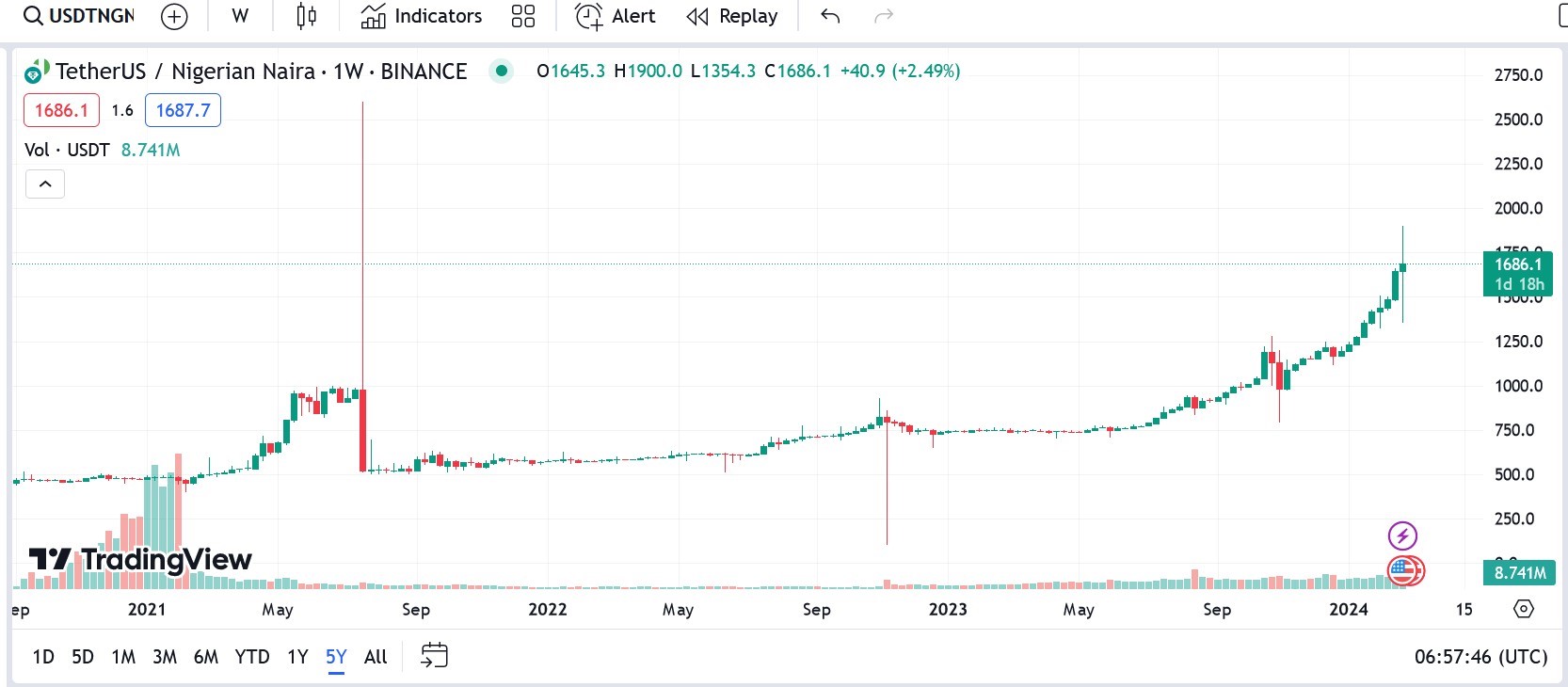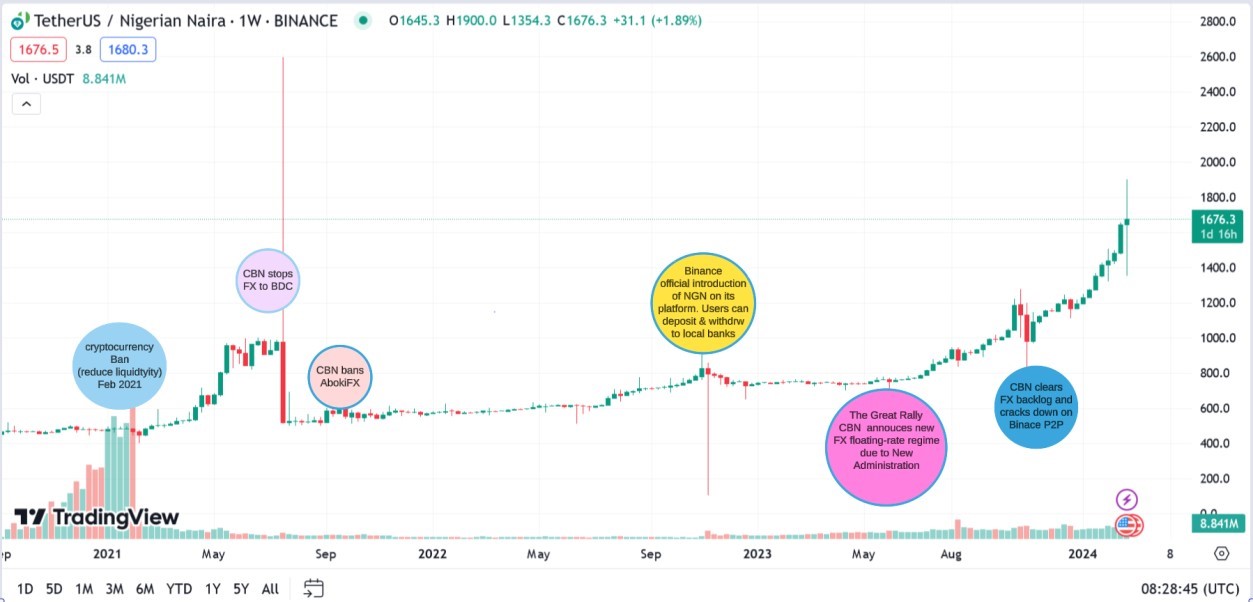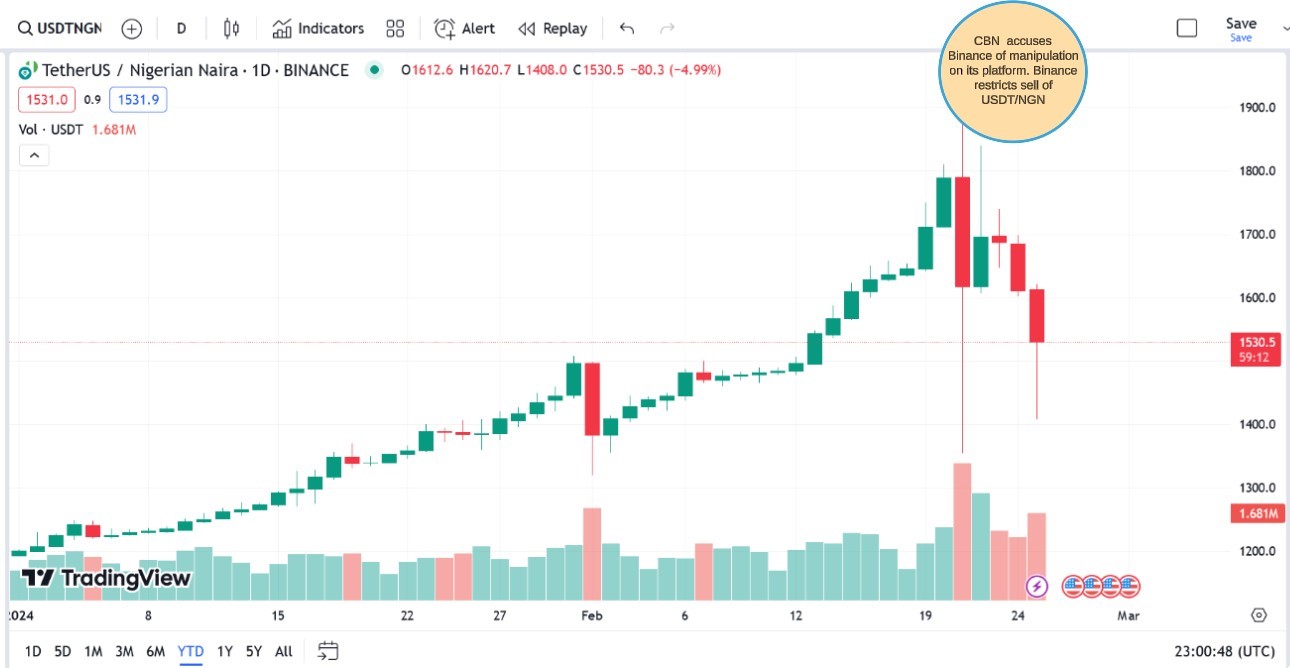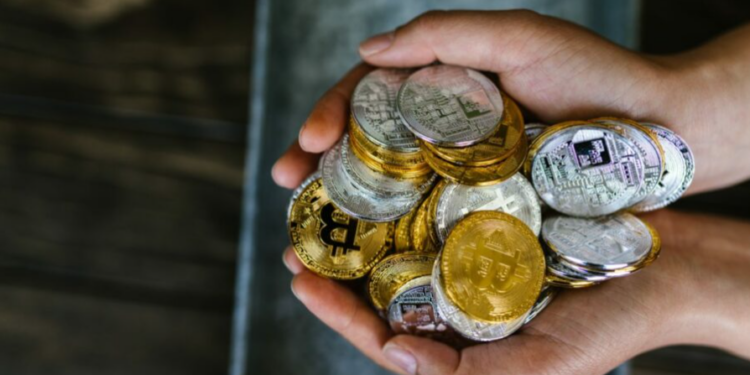A few days ago, I found myself pondering over the perplexing question: “How did the Naira transform into a cryptocurrency?”
The dynamics of the traded value of USDT/NGN began exhibiting characteristics akin to those typically observed in highly volatile cryptocurrencies.
Observing the Naira hovering around N1500, I commenced gathering data on the traded value and order book entries across all crypto exchanges facilitating the trading of the stablecoin USDT to NGN.
The speculation evident in the order book entries was astonishing, with some entries surpassing N3000/$1. With just over 10 order book entries, rates were nearing 2000/1.
Within a few days, the exchange rate escalated to 1800/1, triggering a sense of alarm within me.
It became evident that there exists a significant issue with the Naira, one that many within the government seem oblivious to the influence of this parallel market on the currency’s value is profound.
Despite an average daily trade volume of just $1 million, the currency’s value had fluctuated by over 4%, and on some days, by as much as 6%.
To put this into perspective, the recorded daily cash circulation of Naira, as reported by the CBN, exceeds N3.6 trillion.
Such discrepancies raise concerns, particularly when considering that, by my estimations although they are speculative and lack statistical modelling to validate them the value of the trades causing these disruptions could be merely N500 million at a rate of 500/1 or at most N2 billion under extreme devaluation at 2000/1. These estimations are derived solely from my perspective and observations reflected in the charts.

In the conventional understanding of stablecoins, the NGN traded against the dollar does not fit the criteria, despite being treated as such due to its 1:1 exchange rate with the Nigerian Naira.
While stablecoins are engineered to maintain a stable value relative to a specific asset, such as fiat currencies like the US dollar (USD), the NGN being traded lacks backing in the form of Naira reserves or bonds.
Nevertheless, market perception dictates that it mirrors the currency’s value at a 1:1 ratio.
Presently, crypto exchanges may assert that they have not created a stablecoin for the Naira, thereby absolving themselves of any obligation to back its value on their platforms with Naira reserves.
Consequently, fluctuations are solely governed by algorithms designed to forecast the price movement of the NGN against the stablecoin USDT.
In essence, if the algorithm detects heightened demand for USDT/NGN, the allowable price ceiling may rise to generate more revenue for the platform. Unfortunately, these unregulated increases manifest in the physical Naira, which is exchanged at a 1:1 ratio with the crypto Naira NGN on the exchanges.
Given that this NGN does not qualify as a true stablecoin backed by reserve Naira but trades at parity with the Naira, measures must be implemented to disrupt the “stablecoin effect.”
Recommended reading: Forex crisis – Don’t panic; the tipping point is near
Willing Buyer/Willing Seller – The mistake of floating the Naira
I often initiate discussions on the floating of the Naira by addressing the two prevailing schools of thought on the matter.
One viewpoint contends that the Naira must discover its true value, attributing the existence of multiple exchange rates and arbitrage opportunities to the Federal Government’s pegging of the currency.
The resulting spreads, typically ranging between N100-200, enabled select individuals, particularly bankers, to amass considerable wealth. This situation popularized the notion of “willing buyer/willing seller,” a concept neither entirely erroneous nor wholly accurate.
Conversely, the opposing school of thought argues that no country entirely floats its currency without implementing some form of control.
To enhance the currency’s tradability, it is essential to establish guardrails through continuous monitoring and the development of adaptable policies capable of adjusting to economic indicators and relative currency values. Rather than abruptly announcing a new exchange rate to devalue the Naira, this approach advocates for the gradual adjustment of policies, thereby establishing a new tradeable range for the currency.
Concurrently, emphasis is placed on bolstering key sectors critical for accurately modelling the currency’s value, considering factors such as reserves, production, and export. Until these elements are firmly in place, maintaining the seemingly rudimentary guardrails of fixing the Naira is deemed necessary.
The former school of thought emerged victorious, and the concept of Naira float became the preferred slogan for politicians aspiring to lead the country. While a floating exchange rate is indeed beneficial, as it fosters an efficient market reflecting the country’s economic strength, it necessitates meticulous monitoring and the implementation of controls to ensure adherence to predefined targets.
Entities capable of widespread tradability typically enforce policies and controls to maintain stability within predetermined target ranges. This is crucial as the currency’s value not only impacts economic indicators such as inflation, GDP, and cost-of-living but also political stability, given that waning economic confidence erodes trust in the government.
I liken the current floating-rate regime of the Naira to the concept of naked trading, wherein a trader engages without risk management controls. In this scenario, the Nigerian state assumes the role of the market maker, ensuring liquidity and bearing associated risks.
The Naira’s staggering devaluation of over 100% within the past 6-8 months mirrors the characteristics of naked trading, wherein trading accounts face potential obliteration. However, in the case of the Naira, the risk of unrestrained potential loss persists as it continues its pronounced devaluation.

Naira and Its People – needs an Urgent Action Need
It’s evident that simply relying on the Naira to “find its level” within the current floating exchange rate regime is not only tempting but also imprudent. Urgent action is required to address and rectify the underlying issues contributing to the economic hardship experienced in the country.
The adoption of the floating exchange rate regime, without adequate tools for monitoring and implementing controls, has exacerbated the challenges facing the economy.
This has resulted in a situation where big businesses, which have long considered Nigeria their hub, are now departing due to the associated risks and losses.
Over the past 25 years, these businesses have played a crucial role in providing everyday essentials such as food, bathing and washing soaps, pharmaceuticals, construction materials, as well as contributing to the development of new economy sectors like fintech and venture capital.
Furthermore, the current economic difficulties have led to heightened political instability, with a notable decline in public confidence in the government. This has been accompanied by protests highlighting issues related to hunger and the lack of decent living standards.
To address these pressing concerns, several key areas need to be prioritized:
Dislodging the 1:1 correlation of USDT/NGN on crypto exchanges:
There are lots of benefits that a Naira stablecoin can have but the current iteration of “stablecoin-like” property of the NGN where the Central bank cannot control or make effective intervention should not continue.
A prudent deployment strategy would involve adopting a Fiat-Collateralized Stablecoin model, wherein the NGN or its equivalent is backed by Naira reserves.
This model aligns with established financial risk management principles, as the reserve requirement directly influences the asset’s price movements. Platform owners would have a significant incentive to maintain the tradable asset within a defined range, utilizing effective risk management techniques.
Based on the available data and potential further investigation, it appears that the value of the Naira against the dollar should ideally fall within the range of 400-500.
This range would correspond to periods where parallel trading exerts less influence on the real exchange rate. The recent ban of AbokiFX suggests that the Central Bank may have identified financial inconsistencies, and while the prohibition of crypto-related activities in Nigerian banks seemed stringent, it aimed to mitigate the reliance on parallel markets for a 1:1 NGN-real Naira exchange rate.
It’s essential to clarify that advocating for the re-introduction of the crypto ban is not the intention here. Crypto exchanges can play a role in alleviating the demand for physical dollars.
However, a fixed exchange rate regime could offer the necessary control to ensure that the Naira is priced within the specified range. Additionally, it could slightly disrupt the 1:1 correlation, which may contribute to overall stability.
Recommended reading: Nigeria’s inflation may peak at 44% as naira value worsens
REVERSE Floating-rate regime for Naira
Without delving into the specifics of the required foreign exchange reserves, it’s evident that the benefits of reversing the current policy outweigh the associated costs. To illustrate, the ramifications of maintaining the status quo are becoming increasingly apparent.
Hunger protests have emerged in certain states, signalling a tangible manifestation of discontent. Moreover, there exists a pervasive erosion of confidence in the government, evident in the discourse within numerous messaging groups.
Additionally, there has been a noticeable retreat in investments within the fintech sector, alongside substantial losses incurred by well-established conglomerates such as Unilever and PZ Cussons. These developments serve as warning signs of systemic fragility, potentially leading to social upheaval and, ultimately, the collapse of governmental structures.
The present exchange rate regime necessitates a re-evaluation to foster greater stability and instill confidence among businesses.
It’s imperative to establish clear metrics to gauge the efficacy of the current policy. The rapid devaluation of the currency by over 100% within a short timeframe underscores the inadequacy of the existing approach.
Therefore, it is prudent to address this imbalance promptly through a managed-floating regime, striking a balance that serves the best interests of the country.

With a floating-rate regime, effective monitoring and controls must be in place. While we ensure that we build our expertise and policies that can help tune the economic indices effectively, we need a Fixed-rate regime or a managed-floating-rate regime.
We seem to have missed a parallel market doing just over $1-2m traded value per-day but moving the exchange rate by over 4-5% simply by algorithms that the Central Bank doesn’t control.
Looking at the chart which I have marked with some news/events, it is obvious that the extreme devaluation started around when the floating-rate policy was adopted, loosing over 100% of its value. Just before that, some other shocks corelated to CBN policy of banning crypto and closure of AbokiFX.

Upon reviewing these charts and what appears to be a somewhat relaxed analysis, it leads me to consider that the value of the Naira ought to be established within a range of N450-N500 per $1. This adjustment could witness further enhancements as production, export, and other economic metrics witness substantial improvements.
I am of the opinion that this progress can be achieved through the implementation of appropriate policies and a strong commitment to fostering economic growth.
By having the central bank establish and communicate a target range over a span of 6-12 months, it serves to mitigate disruption within the real market.
Simultaneously, the shocks observed in crypto Naira are accentuated, thereby disrupting the “1:1 stablecoin-like” effect and incentivizing foreign businesses to maintain their presence. This approach effectively reduces foreign exchange losses in their financial records over time.
This sentiment is further validated by recent events, notably when a crypto exchange restricted the selling of USDT/NGN on its platform. Accusations were hurled at the exchange, alleging its complicity in facilitating the manipulation of USDT/NGN on its platform.

Floating exchange rates without proper controls can be likened to naked trading, where risks are not adequately managed. Effective guard rails and monitoring to ensure their exchange rates stay within set targets when adopting a floating exchange rate system must be deployed and this might include:
- Central Bank Intervention: Central banks may intervene in foreign exchange markets to influence the currency’s direction and reduce volatility, known as a “dirty float”
- Setting Limits: Countries may establish upper and lower bounds within which the currency price can fluctuate freely to prevent excessive volatility
- Interest Rate Adjustments: Central banks may adjust interest rates to influence the currency value, although this can sometimes conflict with other macroeconomic objectives
- Foreign Exchange Reserves: Maintaining substantial foreign exchange reserves is crucial for managing currency values effectively under a floating regime
- Managed Floating Exchange Rates: Some countries opt for a managed floating exchange rate system, allowing central banks to intervene regularly to stabilize the currency and reduce.














Great analysis. I hope the government would pay attention to such analysis.